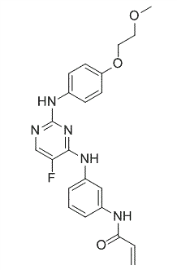All AbMole products are for research use only, cannot be used for human consumption.

Spebrutinib (AVL-292) is an orally available and highly selective covalent inhibitor of Bruton's tyrosine kinase (Btk) that is currently undergoing Phase 1b clinical development for CLL and B-NHL. AVL-292 selectively and covalently bonds to Btk to inactivate and silence its activity. Spebrutinib (AVL-292) inhibited osteoclast function and reduced osteoclast-stimulated proliferation of MM cells. Spebrutinib (AVL-292) was well tolerated from 125-400 mg po QD and early efficacy analysis in CLL and B-NHL shows 10/11 efficacy evaluable pts with SD. The ongoing phase Ib clinical trial of AVL-292 is being conducted in patients with B-cell malignancies, including B-cell NHL, CLL, and WM.
| Cell Experiment | |
|---|---|
| Cell lines | naïve human B cells |
| Preparation method | Immunoblot Analysis. Cells were incubated in serum-free RPMI media for 1–1.5 hours. Isolated human B cells were incubated with CC-292 at a final concentration of 0.001, 0.01, 0.1 and 1 μM. Ramos cells were incubated with 0.1 nM–3 μM CC-292. Cells were then incubated in the presence of compound for 1 hour at 37°C. Following incubation, cells were centrifuged and resuspended in 100 μl of serum-free RPMI and BCR was stimulated with addition of 5 μg/ml α-human IgM. Samples were centrifuged, washed in phosphate-buffered saline (PBS), and lysed in 100 μl of Cell Extraction Buffer plus 1:10 (v/v) PhosSTOP Phosphatase Inhibitor and 1:10 (v/v) Complete Protease Inhibitor. Antibodies used for immunoblot analysis include P-PLCγ2, PLCγ2, Syk, P-Syk, Btk, P-Btk, and Tubulin. Membranes were scanned on a Li-Cor Odyssey scanner using infrared fluorescence detection. |
| Concentrations | 0.001, 0.01, 0.1 and 1 μM |
| Incubation time | 1h |
| Animal Experiment | |
|---|---|
| Animal models | Collagen-Induced Arthritis Model |
| Formulation | not mentioned |
| Dosages | 10,30,50 mg/kg |
| Administration | oral |
| Molecular Weight | 423.44 |
| Formula | C22H22FN5O3 |
| CAS Number | 1202757-89-8 |
| Solubility (25°C) | DMSO 60 mg/mL |
| Storage |
Powder -20°C 3 years ; 4°C 2 years In solvent -80°C 6 months ; -20°C 1 month |
[1] Danilo De Novellis, et al. The TKI Era in Chronic Leukemias
[2] Emanuela Grassilli, et al. p65BTK Is a Novel Biomarker and Therapeutic Target in Solid Tumors
| Related BTK Products |
|---|
| BIIB129
BIIB129 is a covalent, selective inhibitor of Bruton's tyrosine kinase (BTK) capable of penetrating the blood-brain barrier. BIIB129 inhibits the activity of BTK by covalently binding to Cys481 in BTK, thereby affecting the function of B cells and myeloid cells. |
| UBX-382
UBX-382 is an orally available proteolysis-targeting chimeras (PROTACs) that target BTK to inactivate B-cell receptor signaling. |
| GDC-0834
GDC-0834 is a potent and selective BTK inhibitor. |
| DD-03-171
DD-03-171 is a BTK, IKFZ1 and IKFZ3 degrader, the BTK IC50 a value of 5.1 nM. |
| N-piperidine Ibrutinib hydrochloride
N-piperidine Ibrutinib hydrochloride is a reversible Ibrutinib derivative. |
All AbMole products are for research use only, cannot be used for human consumption or veterinary use. We do not provide products or services to individuals. Please comply with the intended use and do not use AbMole products for any other purpose.


Products are for research use only. Not for human use. We do not sell to patients.
© Copyright 2010-2024 AbMole BioScience. All Rights Reserved.
